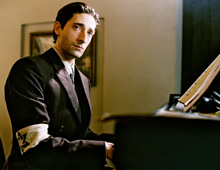|
The Pianist
|
| |
 |
UK/France/Germany/Poland/Netherlands, 2002.
Rated R. 148 minutes.
Cast:
Adrien Brody, Thomas Kretschmann, Frank Finlay, Maureen Lipman, Emilia
Fox, Ed Stoppard, Julia Rayner, Jessica Kate Meyer
Writer: Ronald Harwood, based on the book by Wladyslaw Szpilman
Music: Wojciech Kilar
Cinematographers: Pawel Edelman, Roman Polanski (uncredited)
Producers: Roman Polanski, Robert Benmussa, Alain Sarde
Director: Roman Polanski
LINKS
|
Read the AboutFilm
interviews with Adrien Brody and Thomas Kretschmann.
 oman
Polanski continues to be remembered as one of cinema's most accomplished directors
despite a career that has seemed directionless ever since his ignominious exile
from the United States in 1976. A couple films have found success (notably Tess),
while others, like Pirates and The Ninth
Gate, have bombed. He has been a director searching for renewed focus,
and with the indirectly autobiographical Holocaust film The Pianist,
he has found it.
oman
Polanski continues to be remembered as one of cinema's most accomplished directors
despite a career that has seemed directionless ever since his ignominious exile
from the United States in 1976. A couple films have found success (notably Tess),
while others, like Pirates and The Ninth
Gate, have bombed. He has been a director searching for renewed focus,
and with the indirectly autobiographical Holocaust film The Pianist,
he has found it.
Polanski is himself a Holocaust survivor. Though born in Paris in 1933, he
grew up in Krakow, Poland, where he lived in the Jewish ghetto during the war.
When the Germans took his parents away (his mother died at Auschwitz and his
father survived), Polanski escaped through a hole in the ghetto's barbed wire
fence. Thereafter, he hid successfully with help from Catholic families, often
finding refuge in movie theaters.
Polanski has always known, he says, that he would make a movie about this era
of Polish history, but did not want it to be based on his own life. In Wladyslaw
Szpilman, he has found the perfect surrogate to communicate his own experiences.
Szpilman was a celebrated pianist and composer at the time of the German invasion.
Since 1935, he had been performing live on Polish radio. He was playing Chopin's
"Nocturne in C Sharp" on September 23rd, when the Luftwaffe destroyed the station.
Thereafter, Szpilman's life in Warsaw, detailed in his memoir, paralleled that
of Polanski in Krakow. Szpilman's family was relocated to the Jewish ghetto,
and when they were taken away, he eluded deportation with help from outsiders--including
from some unexpected sources--barely avoiding capture several times and living
constantly on the razor's edge. It is a story of both luck and endurance, both
of which were indispensable to survival.
The Pianist recounts Szpilman's astonishing story in careful, attentive
detail, but it is filled with particulars from Polanski's own life, from the
reality of life in the Jewish ghetto to the awkward position a woman's corpse
assumes after she is shot in the head while Szpilman observes from his hiding
place. Instead of relying primarily on digital effects, Polanski has made The
Pianist the old-fashioned way, constructing huge elaborate sets to recreate
wartime Warsaw, shaped not only by old documentaries, but by Polanski's own
memories.
The Pianist is Polanski's most personal work to date, and perhaps because
of that, Polanski seems to have rediscovered the cinematic voice he had as a
young man. Polanski always had a remarkable talent for portraying psychological
deterioration and instability in a quiet, believably unexaggerated fashion while
at the same time maintaining a high level of suspense. The Pianist recalls
movies like Repulsion and Rosemary's Baby, particularly when the
protagonist is alone for long stretches of time. The sequence when the starving
Szpilman is locked helplessly in an apartment while an uprising rages outside
the window bears the director's unmistakable stamp.
Szpilman is played by Adrien Brody (Summer of Sam, The Affair of the Necklace),
whom Polanski specifically sought out after a broad casting call for an actor
with no experience failed to yield any candidates. To prepare for the six-month
shoot, Brody spent six weeks starving himself and intensively studying the piano
(with which he was already somewhat familiar) in order to play along with the
soundtrack without cutting away. Shooting began with the critical final scenes,
in which Szpilman encounters a German officer with unknown motives played commandingly
by Thomas Kretschmann (U-571, Stalingrad),
whose critical role earned him second billing despite a relative lack of screen
time. Shooting then continued in reverse chronological order, because it's easier
to put weight back on and trim a beard gradually than to do the reverse. Knowing
this makes Brody's transformation from debonair musician to something resembling
Tom Hanks in the latter half of Cast Away
all the more remarkable.
The Holocaust is a period of history well-mined by filmmakers, and that may
be off-putting to some moviegoers. But The Pianist doesn't try to be
a movie with important things to say, going out of its way to examine questions
of ethics and choices. A film that focuses unwaveringly on its protagonist,
The Pianist only records events, often dispassionately. The often heartbreaking
details (look for the scene where the Szpilman family shares a piece of caramel
in their last moments together) accumulate into a narrative, and the narrative
becomes a testament to human capacity for both good and evil, weakness and strength.
By retelling specific experiences and not seeking to be a movie "about" the
whole Holocaust, The Pianist is one of the best Holocaust movies ever
made.
Review
© December 2002 by AboutFilm.Com and the author.
Images © 2002 Focus Features. All Rights Reserved.


